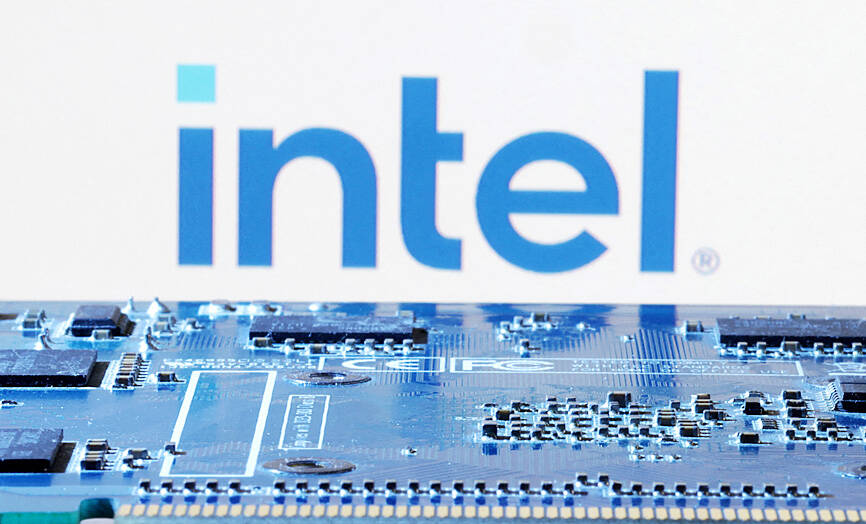Chip designers Nvidia Corp and Broadcom Inc are running manufacturing tests with Intel Corp, two sources familiar with the matter said, demonstrating early confidence in the struggling company’s advanced production techniques.
The two tests, which have not been reported previously, indicate the companies are moving closer to determining whether they would commit hundreds of millions of dollars’ worth of manufacturing contracts to Intel. The decision to do so could generate a revenue windfall and endorsement for Intel’s contract manufacturing business that has been beset by delays and has not yet announced a prominent chip designer customer.
Advanced Micro Devices Inc is also evaluating whether Intel’s 18A manufacturing process is suitable for its needs, but it was unclear if it had sent test chips through the factory.

Photo: Reuters
“We don’t comment on specific customers, but continue to see strong interest and engagement on Intel 18A across our ecosystem,” an Intel spokesperson said.
The tests by Nvidia and Broadcom are using Intel’s 18A process, a series of technologies and techniques developed over years that is capable of making advanced artificial intelligence processors and other complex chips. The process competes with similar technology from Taiwan Semiconductor Manufacturing Co (TSMC, 台積電), which dominates the global chip market.
Testing is under way and can last months. It is unclear when the tests started and manufacturing tests are no assurance that Intel would eventually win new business.
The 18A process was already delayed to next year for potential contract manufacturing customers.
Now, Intel has pushed back its timeline another six months, according to supplier documents reviewed by Reuters and two sources familiar with the matter.
Asked about the delay, Intel said that it would “begin ramping production in the second half of this year, delivering on the commitments we have made to our customers.”
The company added that it expects its factories to receive designs from customers this year.
Intel’s 18A process currently performs at a level between TSMC’s most advanced process and its predecessor, Synopsys Inc CEO Sassine Ghazi said in an interview.
Synopsys supplies some of the crucial intellectual property needed for Intel’s foundry.
Intel is expected to generate US$16.47 billion in revenue from the foundry business this year, although almost all of that revenue is from Intel itself. Revenue for the foundry segment declined 60 percent last year, and the company has said it would not break even until at least 2027.

MULTIFACETED: A task force has analyzed possible scenarios and created responses to assist domestic industries in dealing with US tariffs, the economics minister said The Executive Yuan is tomorrow to announce countermeasures to US President Donald Trump’s planned reciprocal tariffs, although the details of the plan would not be made public until Monday next week, Minister of Economic Affairs J.W. Kuo (郭智輝) said yesterday. The Cabinet established an economic and trade task force in November last year to deal with US trade and tariff related issues, Kuo told reporters outside the legislature in Taipei. The task force has been analyzing and evaluating all kinds of scenarios to identify suitable responses and determine how best to assist domestic industries in managing the effects of Trump’s tariffs, he

TIGHT-LIPPED: UMC said it had no merger plans at the moment, after Nikkei Asia reported that the firm and GlobalFoundries were considering restarting merger talks United Microelectronics Corp (UMC, 聯電), the world’s No. 4 contract chipmaker, yesterday launched a new US$5 billion 12-inch chip factory in Singapore as part of its latest effort to diversify its manufacturing footprint amid growing geopolitical risks. The new factory, adjacent to UMC’s existing Singapore fab in the Pasir Res Wafer Fab Park, is scheduled to enter volume production next year, utilizing mature 22-nanometer and 28-nanometer process technologies, UMC said in a statement. The company plans to invest US$5 billion during the first phase of the new fab, which would have an installed capacity of 30,000 12-inch wafers per month, it said. The

Taiwan’s official purchasing managers’ index (PMI) last month rose 0.2 percentage points to 54.2, in a second consecutive month of expansion, thanks to front-loading demand intended to avoid potential US tariff hikes, the Chung-Hua Institution for Economic Research (CIER, 中華經濟研究院) said yesterday. While short-term demand appeared robust, uncertainties rose due to US President Donald Trump’s unpredictable trade policy, CIER president Lien Hsien-ming (連賢明) told a news conference in Taipei. Taiwan’s economy this year would be characterized by high-level fluctuations and the volatility would be wilder than most expect, Lien said Demand for electronics, particularly semiconductors, continues to benefit from US technology giants’ effort

‘SWASTICAR’: Tesla CEO Elon Musk’s close association with Donald Trump has prompted opponents to brand him a ‘Nazi’ and resulted in a dramatic drop in sales Demonstrators descended on Tesla Inc dealerships across the US, and in Europe and Canada on Saturday to protest company chief Elon Musk, who has amassed extraordinary power as a top adviser to US President Donald Trump. Waving signs with messages such as “Musk is stealing our money” and “Reclaim our country,” the protests largely took place peacefully following fiery episodes of vandalism on Tesla vehicles, dealerships and other facilities in recent weeks that US officials have denounced as terrorism. Hundreds rallied on Saturday outside the Tesla dealership in Manhattan. Some blasted Musk, the world’s richest man, while others demanded the shuttering of his